SXSW 2023: Brooklyn 45
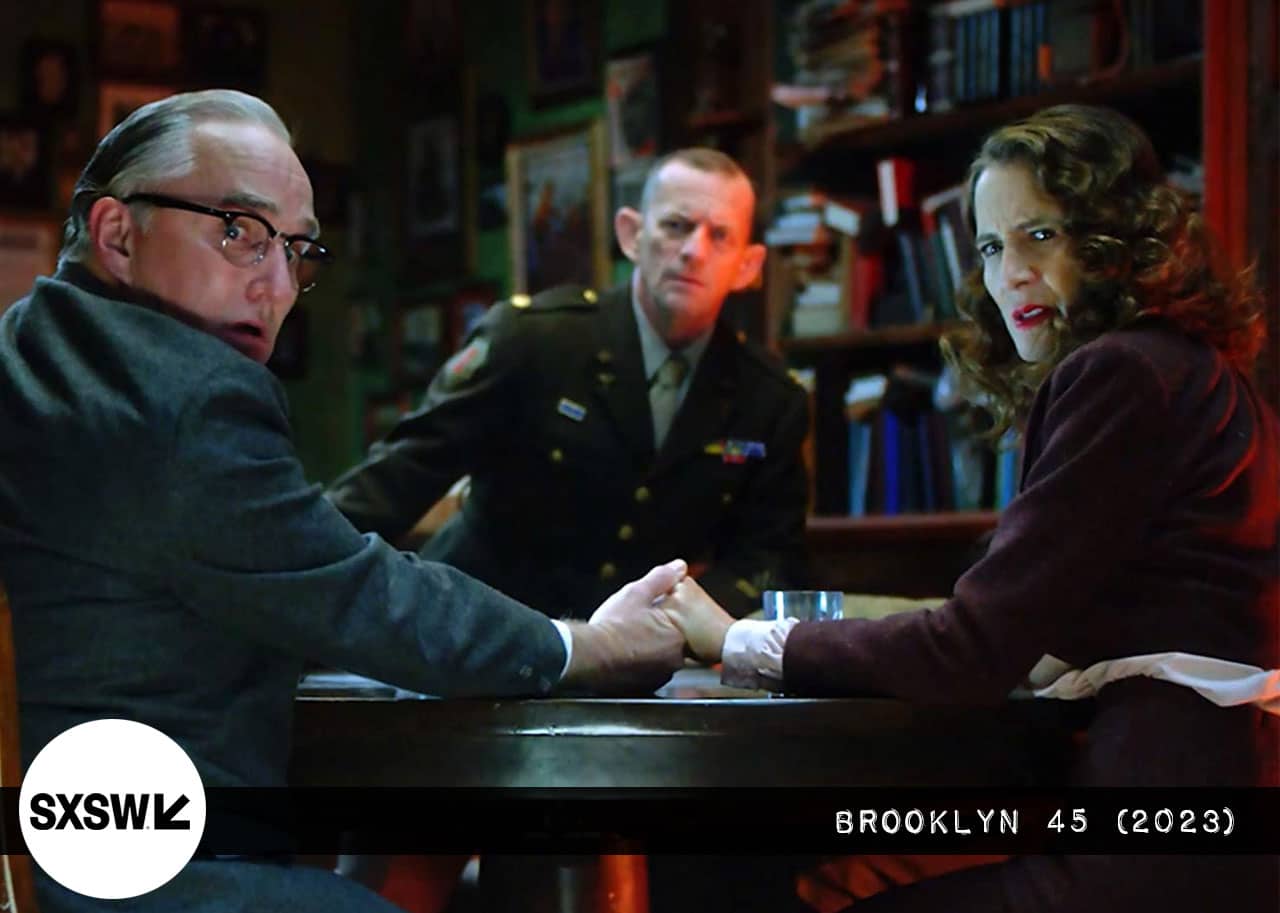


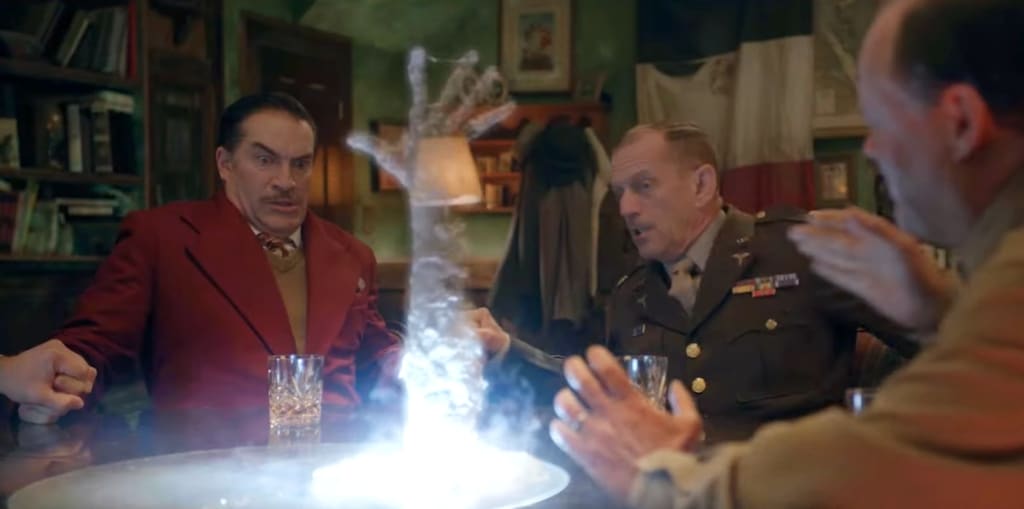
I’ve been a big fan of the criminally underrated filmmaker Ted Geoghegan since his feature film directorial debut, the stellar 2015 homage to old-school supernatural horror films of the 70s, We Are Still Here.
That’s where I first discovered this significant talent. However, he’s been writing genre films since 2000, when he co-wrote German director Andreas Schnaas‘ first English-language film, Demonium (2001), and followed it with numerous genre features in Europe and The United States. He also co-wrote the Korean blockbuster The Berlin File (2013) before beginning his directing career two years later.
Geoghegan followed up his critically acclaimed We Are Still Here with 2017’s Mohawk, another breathtaking representation of his skill as a writer and director.
Thus, when I heard his latest effort, Brooklyn 45, would be making its World Premiere at SXSW In March of 2023, it quickly rose to the top of my must-see list out of the prestigious festival. And I’m thrilled to report it did not disappoint.
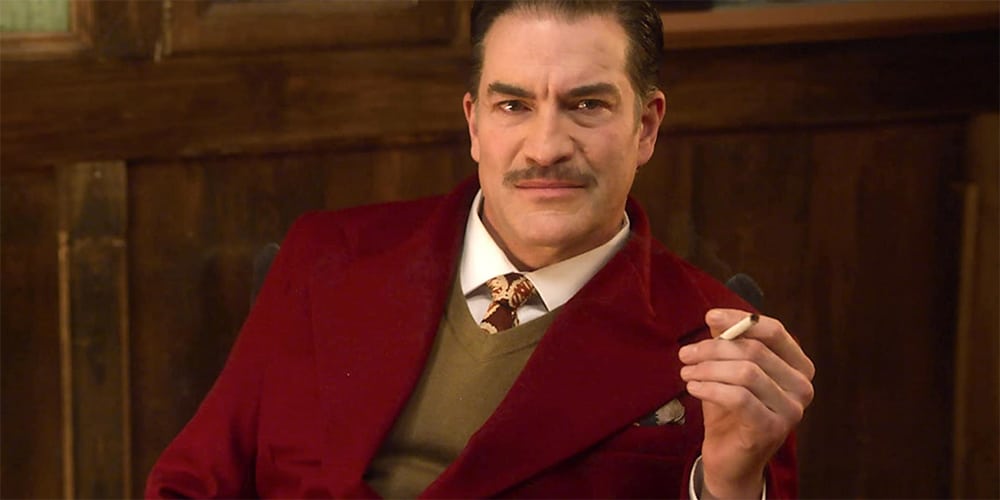
It was Ted’s father who provided important background and infused Ted’s script with sizzling authenticity. Perhaps it’s that deep connection to the material that elevates Geoghegan’s latest indie offering, or perhaps his continued growth as a filmmaker as he has stepped closer to realizing his unique voice.
It’s likely a little from column A and a little from column B. Whatever forces conspired to breathe life into Brooklyn 45, we’re all better off for it.
I adore an intelligent chiller that works on multiple levels, delivering enough atmosphere and suspense to enthrall those who prefer straightforward stories without deeper subtext while being thoughtful and provocative enough to satiate those looking for a richer viewing experience.
In that regard, Brooklyn 45 really delivers.
This single-location chamber piece relies heavily on taut suspense, compelling characters, and captivating performances from its talented ensemble cast. It’s dialog-heavy but never dull thanks to the sharp writing and potent delivery from the actors.
Though there is a supernatural element, at its core, this is a very human story that explores ideas of guilt, paranoia, fear of others, and the shifting landscape of complex morality in the face of unspeakable horror.
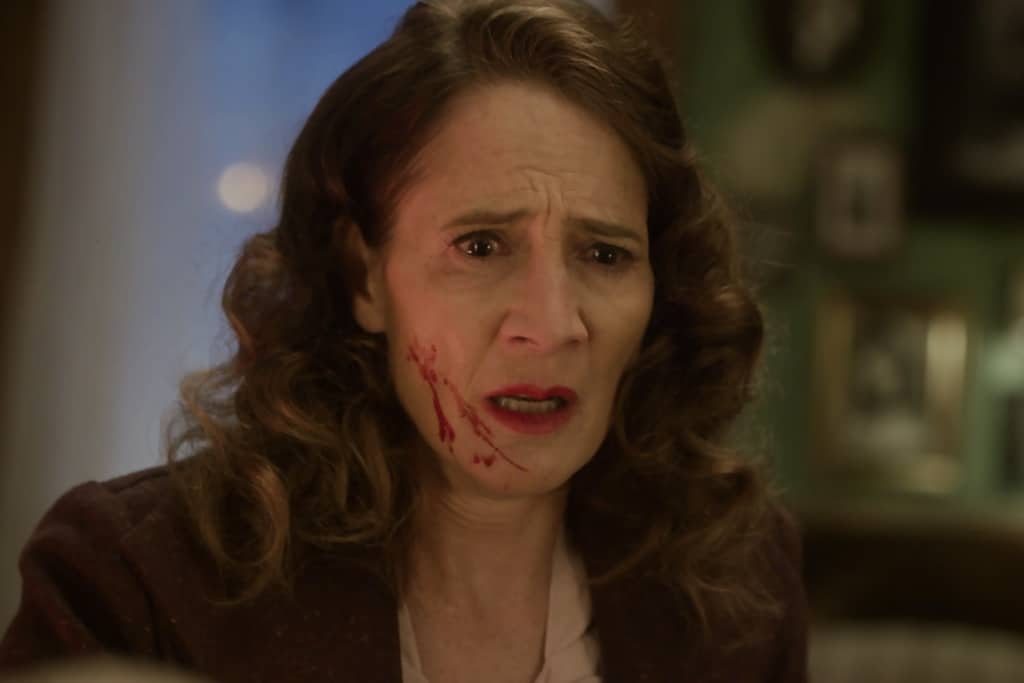
What makes a person good or bad? Can you be a good person and do bad things? Is morality relative? Subjective? Can any of us really be considered all good or all bad, or are we all just shades of murky gray?
BROOKLYN 45 explores one of the darkest periods of our history, a time of collective global trauma, while still feeling — depressingly and uncomfortably — timely and relevant. Click To TweetOn a chilly December night in 1945, a group of friends and World War II vets have gathered at the home of Lt. Colonel Clive “Hock” Hockstatter (the always reliable indie stalwart Larry Fessenden) to support him as he grieves his recently deceased wife. The group is bound by shared experiences of comradery and trauma as a result of their time spent together during the war.
Major Archie Stanton (Jeremy Holm) is a closet gay man who served as Hock’s right-hand man in the service and is currently battling serious war crime allegations that he intentionally killed innocent civilians during combat, a charge he vehemently denies.
Major Paul DiFranco (Ezra Buzzington) is a tough-as-nails, pull-no-punches medical officer who worries his best friend, Hock, is not in his right mind.
Marla Sheridan (Anne Ramsay) was a highly respected Army interrogator with a reputation for being among the best there is when it comes to getting what she wanted from her subjects by any means necessary. A bombing took her out of the field, left her with a permanent limp, and forced her behind a desk at the Pentagon.
That’s where she met her husband, the mild-mannered, paper-pushing Bob (Ron E. Rains). Accompanying her for the evening, he clearly adores his wife. But the woman he met and fell and love with is very different from the war machine her friends know her as.
Bob is clearly the odd man out among the group and has little interest in traipsing down memory lane with the brutish soldiers or being reminded that his loving wife was once one of them.
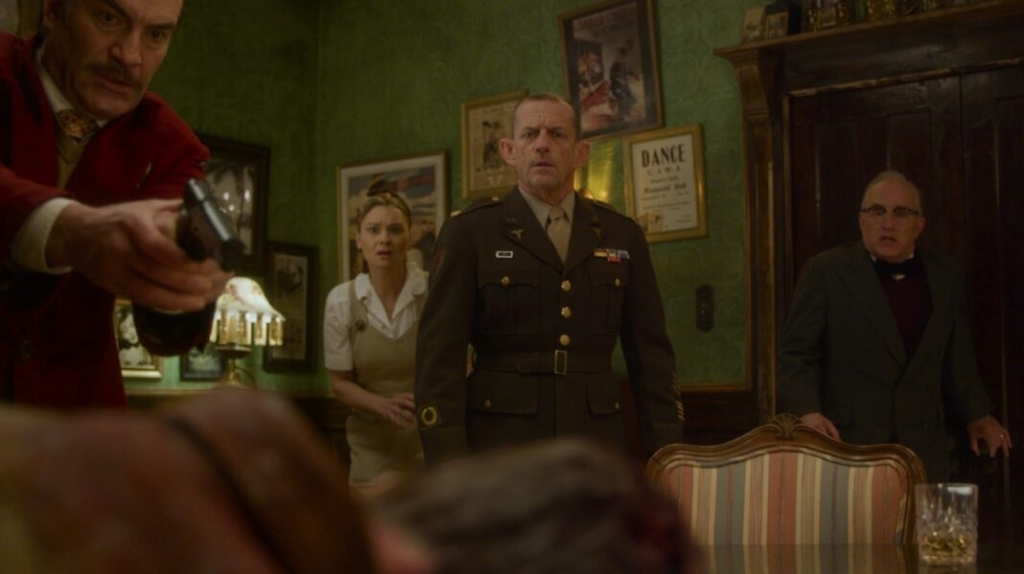
Despite being longtime friends, they often bicker and vehemently disagree. Each of them harbors old wounds that are far from healed. And while shared trauma unites them, it also threatens to tear them apart at a moment’s notice.
The alpha of the group, Hock, is definitely not himself, and for good reason. His beloved wife, Susan, has just committed suicide after seemingly losing her mind. She had begun to suffer from severe paranoia, convinced that their German neighbors were actually Nazi spies.
She tried desperately to convince her husband she wasn’t crazy, but he repeatedly dismissed her.
Now utterly wracked with guilt and heartbroken over the idea that his soul mate is bound for hell because of her perceived sin — as explained by his priest, who offered little comfort to Hock in his time of grieving — he pleads with his friends to join him in a séance to try to contact Susan.
His friends protest strongly, but Hock insists he just needs to know she’s at peace and that she can forgive him so he can finally let go and move on with his life.
Reluctantly agreeing for the sake of healing, the friends join Hock at his parlor room table, lock hands, and attempt to make contact with the other side. As you can imagine, things do not go well.
It’s not a spoiler to say that there is an actual ghost, but Geoghegan is far more concerned with ghosts of the past that haunt these characters and force them to confront who they are and whether or not their own sins can be forgiven. The most terrifying specter is the choices made and regrets that refuse to stay buried.
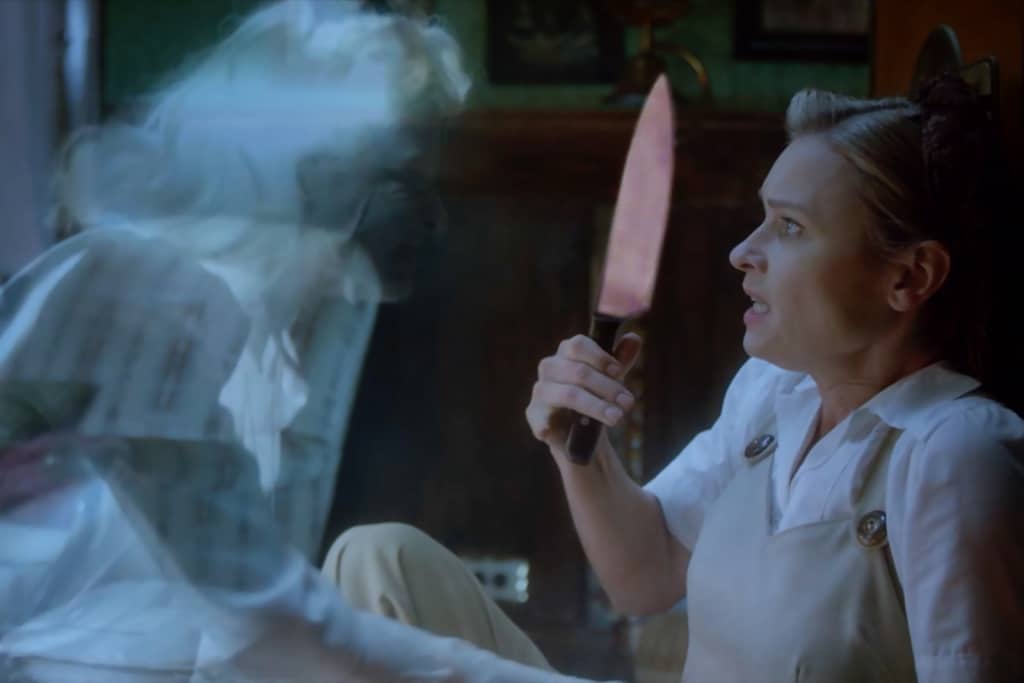
But as with so many of the most enduring horror stories from past and present — including the brilliant series The Twilight Zone from which Brooklyn 45 seems to take at least partial inspiration — the most dangerous threat is the monstrosity of human nature rather than an external otherworldly evil.
As they prepare for the séance, Hock explains, “All you really need is a mirror.”
That powerfully sets the stage for the crux of this beautifully constructed pressure cooker of a film, which forces our cast to hold a mirror up and examine their own character and the consequences of their actions.
Our cast of veterans are heroes. They looked evil in the eyes and defeated it.
But as Nietzsche once said (in Beyond Good and Evil), “Battle not with monsters, lest ye become a monster, and if you gave into the abyss, the abyss gazes also into you.” Nietzsche cautioned that anyone who fights monsters risks becoming a monster himself.
And those inner monsters are confronted when a surprise visitor makes a startling appearance. Hock’s suspected Nazi neighbor, Hildegard Baumann (a phenomenal Kristina Klebe), tumbles out of a closet, having been kidnapped by Hock.
Now trapped in a room they can’t escape, the group must debate what to do with the woman who insists she’s a victim of fear and prejudice. While some of the group is desperate to put their troubled past behind them and forget about the atrocities of war, at least one is convinced that the fight has simply moved to another battlefront.
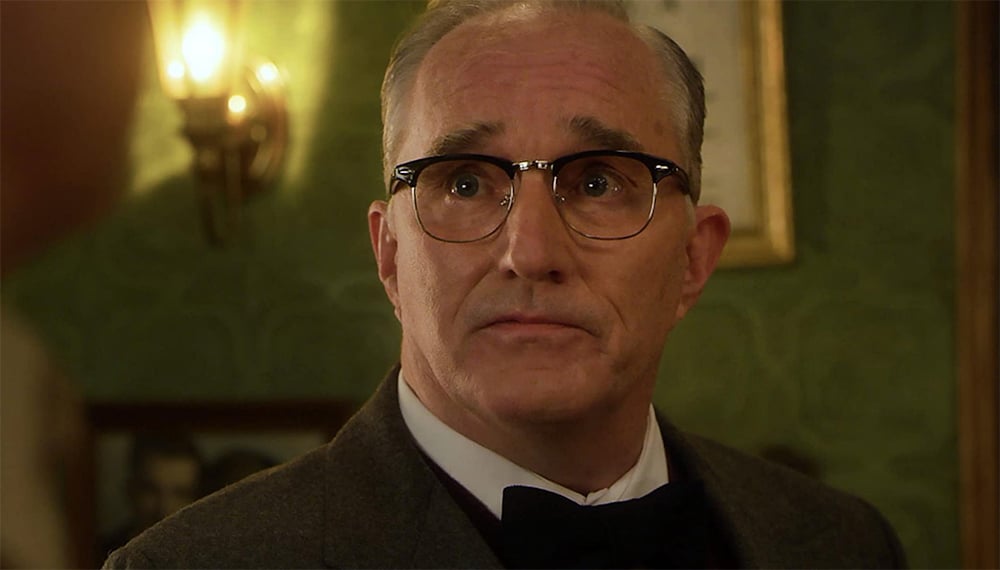
If that sounds dull or preachy, I assure you, it’s not.
The exchanges are absorbing and fraught with tension. And it’s impossible not to invest in these complex characters, brought to life by a cast of master thespians.
In a shrewd and subversive twist, Geoghegan makes the expert torturer, Marla, the voice of reason and compassion.
It’s a clever way of making us question our own ideas of right and wrong. If we consider her the savior of the group, we’re forced to reconcile the knowledge that she’s done horrific things in pursuit of military victory, and we must decide what’s forgivable — just as Marla and the others must decide whether any of them deserve to be absolved of guilt.
In the midst of all this deep philosophical warfare, there are genuine moments of shiver-inducing surprise you will definitely not see coming.
The intense action takes place almost entirely in a single room, making it feel a bit like a stage play. But as he proved with We Are Still Here, Geoghegan expertly maximizes his resources and turns limitations into assets.
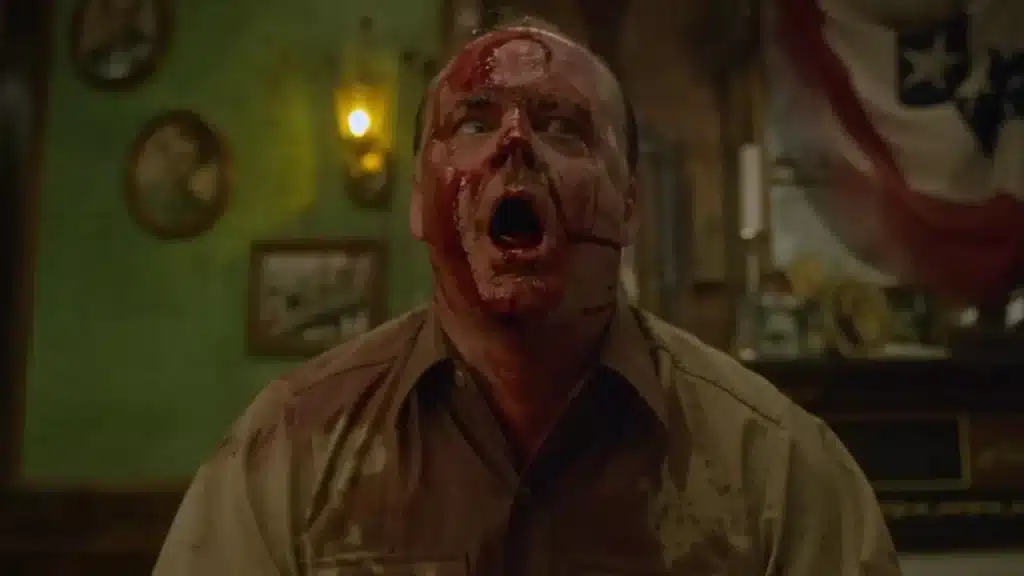
An acute attention to detail makes the small set feel authentic and consistently intriguing, while Geoghegan’s command of the camera keeps the proceedings feeling dynamic and visually engaging.
The lack of easy answers may feel somewhat unsatisfying, but it also rings painfully true. Ultimately, life rarely gives us anything in black and white. And words like good and evil may just be esoteric ideas that offer little real understanding of human nature.
Geoghegan also reminds us that you can eradicate people and countries, but you can’t eradicate the type of hatred and fear that gives rise to the most unspeakable humanitarian atrocities. You can be the “good” guy and remain as corruptible and morally questionable as the enemy you’re fighting.
That was true in 1945, and it’s equally true today.
I entered my viewing of Brooklyn 45 a fan of Ted Geoghegan, and I left convinced he’s on a trajectory for true greatness. This is his most accomplished film, and it’s breathtaking in just about every way — from a finely crafted and well-paced story to a remarkable cast more than capable of delivering passionate and nuanced performances that keep you hanging on their every word.
It’s also worth noting that the always-excellent Fessenden delivers a career-best performance here, and that’s really saying something.
Currently enjoying a 93% on Rotten Tomatoes at the time of this review, there’s a reason that critics have been showering this gripping chamber horror with well-deserved praise. Don’t miss it!
Follow Us!